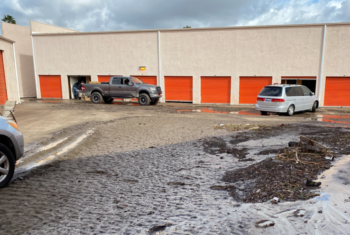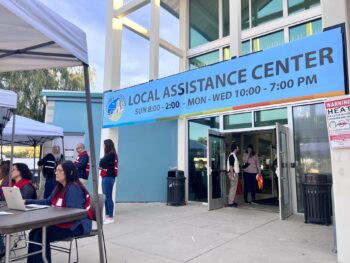“My reality was that I was going to die in prison.”
And Miguel Yescas was perfectly fine with that, until his 4-year-old niece inspired a major turnaround and involvement with the San Diego County-affiliated Project A.W.A.R.E. pointed him in the direction he needed.
Yescas is a former gang member who now talks to school children in San Diego County hoping to help them avoid the mistakes he made early in life that nearly killed him. He spoke Thursday at the Live Well San Diego Building Better Futures anti-gang summit that took place in Vista.
To appreciate where Yescas is today – a college graduate and a guest speaker – you have to know just how far he has come on his journey.
The beginning of a cycle
He first entered the County juvenile system when he was 14. He has been sent to jail 17 times – once a mere 11 days after he was released on probation.
“Ages 13 to 26 were a constant cycle in and out of jail,” said Yescas. “I was involved in drugs and there was a lot of trauma in my life.
“There were a lot of things I never talked about, but I had a lot of trust issues.”
Yescas said he was taught at an early age that violence was a way to express your feelings and gangs were the perfect outlet for that philosophy.
His escalation to gang membership started in middle school, where he bullied and preyed on weaker kids.
“There were little cliques and crews in middle school,” he said. “We had little names we gave ourselves and we would fight in the bathrooms and physical education classes. It’s really no different than a prison yard.”
Yescas started going to parties and eventually began tagging, which brought a culture of even more violence to his life.
RELATED: Probation Aims to Inspire at Passport to Life Event
“My involvement started off trying to be a part of the crowd, and I needed an identity,” he said. “By the time I was 19, I really saw where my life was going and that prison was going to be a big part of it. I wanted to be accepted in the system.”
His start with smaller offenses like vandalism, public intoxication, loitering and possession of marijuana soon escalated to battery and assault.
“When I got introduced to the juvenile and prison systems, it was like ‘I’m home,” Yescas said. “Getting out of jail to me sometimes was like coming home from Iraq because I felt people respected me and looked up to me because that’s how I saw it when I was a child.”
The light at the end of the tunnel
He was in and out of several different rehabilitation programs. The first sign of a U-turn in his life came when he was offered drug court in 2007 after being charged with armed robbery.
“I learned a lot there, but I was still just taking advantage of the system. I wasn’t ready to change and I wanted to straddle the fence,” he said. “The help was there – it was always there – but I just wasn’t ready to apply the tools to change everything about myself.”
It wasn’t until five years later, sprawled out on a bathroom floor with a syringe hanging from his arm that he finally had that moment where everything changed.
It was a progression of addictions that led to that point. He started off with alcohol and marijuana growing up. At 14, he started smoking crack cocaine and then discovered crystal meth at 16 before heroin took over and he became an IV drug user.
One morning, he over-dosed and was lying on the bathroom floor when his 4-year-old niece found him.
“I woke up to her saying my name over and over,” he said. “And I just remember the syringe was still in my arm and I kept looking at it. I couldn’t comprehend to take it out and hide it from her.
“That’s when I realized how selfish I was.”
Up to that point Yescas felt he was entitled to hurt other people. He had excuses to disappoint and hurt everyone in the world in his eyes.
“But this little girl,” he said. “She’s just 4 years old and she has this unconditional love for me. She doesn’t know about my past.”
Recognizing the need for help
Shortly after that morning, he had a family meeting with his brothers and sisters, then talked to his parole officer.
“I went and told my parole officer, ‘I’m doing bad and I’m going to die out here,’” he said.
He craved the structured life prison offered him and the limitations being incarcerated placed on him.
“I needed someone telling me when to sleep, how to sleep, who to hang out with and who not to hang out with. Prison was the only thing that could hold me down.”
Instead, with the help of his parole officer he was sent to a program called Amity in Vista, where the people around him would be less familiar and less likely to encourage a relapse. His counselor had done 26 years in prison and he helped Yescas become comfortable with who he was as a person.
RELATED: Success Stories Inspire Juveniles in Detention
“He was the most humble man and someone I would normally respect for all the bad things he had done,” he said. “But he flipped the script on me and that’s what it took.”
Yescas cleared all the contacts out of his phone and started pouring himself into volunteer work and being a guest speaker.
“I took a look at my background and future and something that I needed in my life was to give back,” he said. “I needed to be of service and need to know I’m making up for a lot of the disservice that I’ve done to my community, to my family and mostly to myself.”
Making a difference in the future
He began speaking to other rehabilitation programs and then started speaking in the San Diego County Juvenile Court and Community Schools and San Diego Unified School District classrooms. He teaches students about emotional literacy and self-worth through Project A.W.A.R.E. (Attitude When Angry and Resolving Emotional issues non-violently).
“I just want these kids to have something to root for,” he said. “They have potential and if they set their mind to something they can do it.”
His advice to parents is that if they think they have a child that needs to be “fixed,” they should pay attention to them and shower them with love.
“Just love and care for that child until they learn to do it for themselves,” he said. “Giving them the ability to have some self-worth is where it’s at. A child that cares about himself isn’t going to jeopardize himself or his freedom or poison his body with any substance.”
Yescas went to school to become a counselor for alcohol and other substance abuse.
When he graduated, it was made even more significant because of who was by his side.
“I had my little niece there and I was just crying like a little girl,” he said. “I couldn’t stop. My niece accepted my certificate for me and she was like, ‘why are you crying?’”
They were happy tears, Yescas said.






